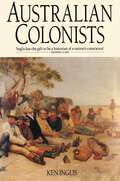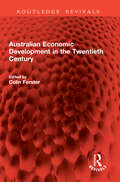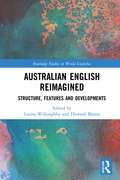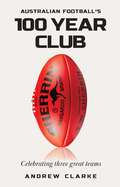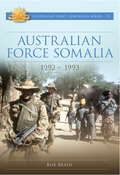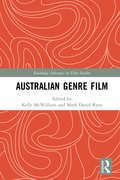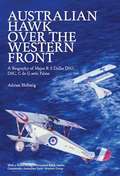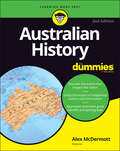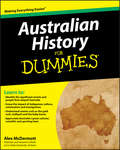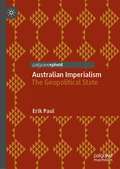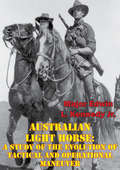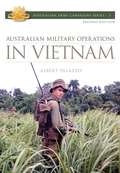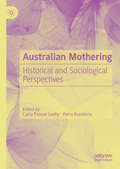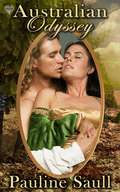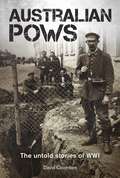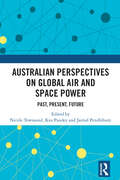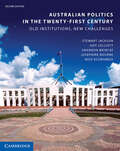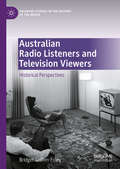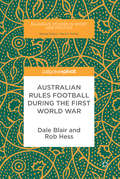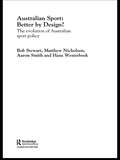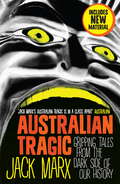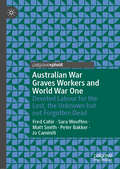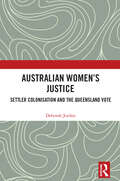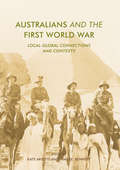- Table View
- List View
Australian Colonists
by Ken InglisA social history of the period from 1788 to 1870 from the beginning of British settlement of Australia to the year when the last British soldiers sailed home from the colonies. In his inimitable fashion Inglis tells the story of convicts, currency lads and emigrants settling into their new land. The newcomers brought with them from the old world their traditional holidays and made their own fetes in the new. We see them facing natural enemies in the land, and having their tranquillity shattered by bushrangers as well as rebellious convicts, military officers and gold diggers. With them we hear the sounds of distant war. We meet the men they honoured, and we read of efforts by poets and orators to turn the Australian experience into history.
Australian Economic Development in the Twentieth Century (Routledge Revivals)
by Colin ForsterFirst published in 1970, Australian Economic Development in the Twentieth Century analyses aspects of Australian economic development in the twentieth century and places them in historical and international perspective. In Australia, the nineteenth century has been studied much more intensively than the twentieth, and in this latter period the long-run examination of almost any economic topic must break new ground. The main economic histories of the period were written either before the Second World War or come close to general history. Earlier works have naturally dated, and little has been done to integrate the periods before and after the war.The book takes a step towards filling a wide gap in our understanding of Australian development and covers the period from the depression of the 1890s right up to the 1960s. It is the product of a team of Australia’s economic historians working together, but each sovereign on his own special subject. This volume will appeal not only to economic historians but to a wider public interested in Australia’s history.
Australian English Reimagined: Structure, Features and Developments (Routledge Studies in World Englishes)
by Howard Manns Louisa WilloughbyAustralian English is perhaps best known for its colourful slang, but the variety is much richer than slang alone. This collection provides a detailed account of Australian English by bringing together leading scholars of this English variety. These scholars provide a comprehensive overview of Australian English’s distinctive features and outline cutting-edge research into the variation and change of English in Australia. Organised thematically, this volume explores the ways in which Australian English differs from other varieties of English, as well as examining regional, social and stylistic variation within the variety. The volume first explores particular structural features where Australian English differentiates itself from other English varieties. There are chapters on phonetics and phonology, socio-phonetics, lexicon and discourse-pragmatics as these elements are core to understanding any variety of English, especially within the World Englishes paradigm. It then considers what are arguably the most salient aspects of variation within Australian English and finally focuses on historical, attitudinal and planning aspects of Australian English. This volume provides a thorough account of Australian English and its users as complex, diverse and worthy of study. Perhaps more importantly, this volume’s scholars provide a reimagining of Australian English and the paradigm through which future scholars may proceed.
Australian Football's 100 year club
by Andrew ClarkeThe parallel histories of three centenary AFL clubs: Hawthorn, North Melbourne and the Western Bulldogs.Three AFL football clubs. Three centenaries. Three very different histories. AFL stalwart clubs Hawthorn, North Melbourne and the Western Bulldogs all joined the league in 1925. The trio have shared an intertwined history over the ensuing century – and vastly contrasting fortunes on and off the field. Australian Football's 100 Year Club celebrates the centenaries, plotting the ebb and flow experienced by each popular club. Author Andrew Clarke explores both their successes and the hard times, recounting the social histories that helped shaped these three teams. A must for any AFL fan.
Australian Force Somalia: 1992-1993
by Bob BreenIn 1992, civil war, drought and economic collapse left four million Somalis destitute, displaced and starving. Twenty-six nations sent their young men and women to make sure that food reached those who needed it. Australia joined this international &‘coalition of the willing&’ with the Australian Force Somalia comprised of a 1,000-strong battalion group based on 1st Battalion, the Royal Australian Regiment from the 3rd Brigade in Townsville as well as a small national liaison headquarters from 1st Division in Brisbane. Opposing the US-led Unified Task Force were Somali warlords and their militia armies that had been pillaging humanitarian aid and terrorising the Somali population during a bloody civil war. American airpower forced the warlords to send their armies into hiding across the border, but thousands of bandit groups, criminal gangs and violent political factions remained to threaten humanitarian operations and the safety hundreds of ex-patriate aid agency staff. Australian Army units will serve in troubled parts of the world in the future. The lessons learned from the &‘unforgiving school of trial and error&’ in Somalia in 1992/93 will be invaluable. They will apply not only to those confronting hostile groups on the frontline but also those who command and support them from higher levels of command. Operations in 1993 were Exhibit A for change in the ways and means for mobilising, preparing and sustaining land forces serving overseas.
Australian Genre Film (Routledge Advances in Film Studies)
by Kelly McWilliamAustralian Genre Film interrogates key genres at the core of Australia’s so-called new golden age of genre cinema, establishing the foundation on which more sustained research on film genre in Australian cinema can develop. The book examines what characterises Australian cinema and its output in this new golden age, as contributors ask to what extent Australian genre film draws on widely understood (and largely Hollywood-based) conventions, as compared to culturally specific conventions of genre storytelling. As such, this book offers a comprehensive and up-to-date survey of Australian genre film, undertaken through original analyses of 13 significant Australian genres: action, biopics, comedy, crime, horror, musical, road movie, romance, science fiction, teen, thriller, war, and the Western. This book will be a cornerstone work for the burgeoning field of Australian film genre studies and a must-read for academics; researchers; undergraduate students; postgraduate students; and general readers interested in film studies, media studies, cultural studies, Australian studies, and sociology.
Australian Hawk Over the Western Front: A Biography of Major R S Dallas DSO, DSC, C de G avec Palme
by Adrian HellwigThe true story of Australia&’s greatest flying ace and his WWI victories, based on his letters, combat reports, and other documents. Includes photos. Major Roderick Dallas is Australia&’s leading air ace of all time and, with fifty victories, also one of the highest-scoring Commonwealth aces. Yet, until this excellently researched volume, there has never been a full biography of this exceptional pilot, whose fighting career spanned from 1916 to 1918. Flying Nieuport Scouts, Triplanes, and Camels with the RNAS and RAF, he was an ever-present threat over the Western Front and the scourge of the German Air Force. Adrian Hellwig&’s book has been taken principally from primary sources—Dallas&’s own letters, log book, and service record, in addition to squadron record books, combat reports and contemporary accounts—and his resulting conclusions will surprise many. Here is a fitting tribute not just to Australia&’s greatest war hero of the air but to a man any country would be proud to call its own.
Australian History For Dummies
by Alex McDermottExplore the land down under with your friends at Dummies Australia might be most famous for kangaroos, koalas, friendly people, and decidedly unfriendly critters (like the black widow spider, yikes!), but did you know that its government was dismissed by the British Crown in 1975? Or that human beings have lived on the continent for around 65,000 years? In Australian History For Dummies, you???ll discover all that ??? and more ??? as you discover the history of Indigenous Australians, colonial explorers, and the modern inhabitants of one of the most fascinating nations, islands, and continents in the world today!
Australian History for Dummies (For Dummies Ser.)
by Alex McDermottCreated especially for the Australian customer! Exciting and informative history of the land down under Australian History For Dummies is your tour guide through the important events of Australia's past, introducing you to the people and events that have shaped modern Australia. Be there as British colonists explore Australia's harsh terrain with varying degrees of success. In this informative guide you'll Find out about Australia's infamous bushrangers Learn how the discovery of gold caused a tidal wave of immigration from all over the world Understand how Australia took two steps forward to become a nation in its own right in 1901, and two steps back when the government was dismissed by the Crown in 1975 Discover the fascinating details that made Australia the country it is today!
Australian Imperialism: The Geopolitical State
by Erik PaulIn his critical study of Australian imperialism, Erik Paul analyses the making, character and contours of the geopolitical state from the time of the British invasion and colonisation to the present, expanding the country’s continental political and economic power. War is the crucible for its hegemonic power, nationalism, and politics. The book exposes and dissects capitalist imperialism to control and manage a growing population and to impose the grand strategy of a US client state. The geopolitics in the partitioning of the earth and the exploitation of people and the biosphere continue to create major conflict, inequality, and human suffering. Australia plays an important role in the intensification of the struggle among major powers and in the outcome of an expanding global ecological and hegemonic crisis. But the existing Australian state of exception constitutes a major obstacle to a reconciliation with China and to a peaceful regional and world order.
Australian Light Horse: A Study Of The Evolution Of Tactical And Operational Maneuver
by Major Edwin L. Kennedy Jr.This study analyzes the actions of the Australian Light Horse in the Middle East campaign during World War I. It shows the basis for their approach to war and how these techniques were successful by adapting to the circumstances of the situation. The Australian Light Horse demonstrated the traits of initiative and flexibility during the campaign in Egypt and Palestine by changing their modus operandi from mounted infantry to cavalry, a seemingly minor shift semantically, a major shift doctrinally.Their adaptability to the situations in the desert was largely responsible for their tactical successes and played a major part in the success of the operational maneuver of the mounted forces under General Allenby during the last year of the war. Most importantly, the lessons learned from their actions sustained the advocates of horse cavalry doctrine long after the apparent usefulness of the horse on the modern battlefield had diminished in importance.
Australian Military Operations In Vietnam (Australian Army Campaigns Series #3)
by Albert PalazzoFrom 1962 to 1972 Australia joined the United States in fighting a communist inspired insurgency war in the jungles of South Vietnam against infiltrators who sought to overthrow the local government. Over 50,000 Australians served in Vietnam, 519 lost their lives, and the conflict ended ignominiously in the insurgents' victory. Over 30 years later, Australia again finds itself joined with the United States in a struggle against an insurgency, this time in the deserts of Iraq and the mountains of Afghanistan. Although now in the past, the Vietnam War resonates with lessons for the Australian Army as it strives to defeat not Communism but Terrorism. Australian Military Operations in Vietnam highlights some of the successes and failures of an earlier generation of officers for the benefit of today's leaders.
Australian Mothering: Historical and Sociological Perspectives
by Petra Bueskens Carla Pascoe LeahyThis collection defines the field of maternal studies in Australia for the first time. Leading motherhood researchers explore how mothering has evolved across Australian history as well as the joys and challenges of being a mother today. The contributors cover pregnancy, birth, relationships, childcare, domestic violence, time use, work, welfare, policy and psychology, from a diverse range of maternal perspectives. Utilising a matricentric feminist framework, Australian Mothering foregrounds the experiences, emotions and perspectives of mothers to better understand how Australian motherhood has developed historically and contemporaneously. Drawing upon their combined sociological and historical expertise, Bueskens and Pascoe Leahy have carefully curated a collection that presents compelling research on past and present perspectives on maternity in Australia, which will be relevant to researchers, advocates and policy makers interested in the changing role of mothers in Australian society.
Australian Odyssey
by Pauline SaullElla Bickerstaff is widowed on the way to Australia in the late 1800’s. Finding a stash of money on her husband, she decides to stay in the new country and invest her findings in a fruit orchard. Determined that she’ll never again be tied in a loveless marriage, her willpower is severely tested when she meets her charismatic neighbor, the owner of Glen Ayre Farm, Lucas Helm. Lucas, sent to Australia on a false charge of attempted rape, has his eyes on Ella’s orchard for its neverending water supply, which would be a boon to his ranch, and he sets out to woo Widow Bickerstaff. Ella, happy with her new life, nevertheless finds herself drawn to Lucas.
Australian POWs: The untold stories of WWI
by David Coombes&“Comrades in distress we were, and it was now that one felt the existence of a brotherhood that establishes itself in circumstances of this kind … A few of the men are very dejected, and appear to be losing all interest in themselves, their habits and practices not being approved by the majority. In some cases, for the most miserable reward, they cringe to the Germans for the chance of being of some service; others also, despite the fact their bodies can ill-afford the sacrifice, trade their boots and other clothing in exchange for food and smokes … This is regrettable, but censure has no effect on the few. Most of us have resolved to maintain some sort of dignity, though &’tis difficult.&” So wrote Australian prisoner of war (POW) Corporal Lancelot Davies who was captured at the First Battle of Bullecourt on 11 April 1917 where Allied forces were &‘badly smashed up&’. Davies was one of almost 1,200 Australians captured that day, facing an uncertain future at the hands of their German captors. – he described the future as &‘blank&’ and unpredictable. The experiences of Australian prisoners of war (POWs) or Kriegsgefangeners held captive in Germany has been largely forgotten or ignored – overshadowed by the horrid stories of Australians imprisoned by the Japanese during World War Two. Yet, as David Coombes makes known, the stories are interesting and significant – not only providing an account of what those young Australian soldiers experienced, and the spirit they showed in responding to captivity – but also for the insight it provides into Germany in the last eighteen months of the war. Coombes draws upon previous inaccessible records – including the interviews conducted many years before by Chalk – as well as private papers and unpublished manuscripts. He paints a vivid picture of young soldiers who survived the trauma of battle, only to find themselves facing an unknown fate at the hands of an often vindictive and cruel enemy. These &‘comrades in distress&’, many wounded and traumatised by trench warfare, quickly discovered the bond of brotherhood, often the key to survival in a harsh environment with little food, poor medical treatment, back-breaking work and the anguish of confinement. What emerges in the pages of this amazingly detailed account is the typical Australian sense of humour and the sheer will to live that marked these men. Above all, it was their determination to be free and to return once more to their families that ensured their survival; often against overwhelming odds. Crossing the Wire is a fitting tribute to the World War One soldiers and POWs. David Coombes highlights the ordeals these men went through, their stoicism in enduring their mistreatment, and the fearlessness of a few in launching ingenious attempts to escape. He proves beyond doubt that their stories are by no means less compelling than those of their World War II brothers.
Australian Perspectives on Global Air and Space Power: Past, Present, Future
by Nicole Townsend Kus Pandey Jarrod PendleburyThis book surveys historical and emerging global air and space power issues and provides a multidisciplinary understanding of the application of air and space power in the past and present, as well as exploring potential future challenges that global air forces may face. Bringing together leading and emerging academics, professionals, and military personnel from Australia within the field of air and space power, this edited collection traces the evolution of technological innovations, as well as the ethical and cultural frameworks which have informed the development of air and space power in the 20th and 21st centuries, and contemplates its future. It covers topics such as the insurgent use of drones, the ethics of air strikes, the privatisation of air power, the historical trajectory of air power strategy, and the sociological implications of an ‘air force’ identity. While many of the chapters use Australian-based case studies for their analysis, they have broader applicability to a global readership, and several chapters examine other nations’ experiences, including those of the United States, and the United Kingdom. This accessible, illuminating book is an important addition to contemporary air and space power literature, and will be of great interest to students and scholars of air power, air warfare, military and international history, defense studies, and contemporary strategic studies, as well as military professionals.
Australian Politics in the Twenty-First Century: Old Institutions, New Challenges
by Nick Economou Shannon Brincat Stewart Jackson Joff Lelliott Josephine Bourne<p>The global political environment in the twenty-first century is proving dynamic and challenging for Australian policymakers and political institutions. Australian Politics in the Twenty-first Century contextualises the Australian political landscape through an institutional lens. It examines the legislative and judicial bodies, minor parties, lobby groups, the media and the citizenry, providing historical and contemporary facts, explaining political issues and examining new challenges. The second edition has been updated to reflect the application of political theories in today's civic environment. New spotlight boxes highlight issues including marriage equality, COVID-19 and federalism, the inclusion of First Nations peoples in the political system, and gender equality in public policy. Short-answer, reflection, research and discussion questions encourage students to test and extend their knowledge of each topic and to clearly link theory to practice. Written in an accessible and engaging style, Australian Politics in the Twenty-First Century is an invaluable introduction to the Australian political system.</p>
Australian Radio Listeners and Television Viewers: Historical Perspectives (Palgrave Studies in the History of the Media)
by Bridget Griffen-FoleyThis lively and accessible book charts how Australian audiences have engaged with radio and television since the 1920s. Ranging across both the commercial and public service broadcasting sectors, it recovers and explores the lived experiences of a wide cross-section of Australian listeners and viewers. Offering new perspectives on how audiences have responded to broadcast content, and how radio and television stations have been part of the lives of Australians, over the past one hundred years, this book invites us into the dynamic world created for children by the radio industry, traces the operations of radio and television clubs across Australia, and uncovers the workings of the Australian Broadcasting Commission’s viewers’ advisory committees. It also opens up the fan mail received by Australian broadcasting stations and personalities, delves into the complaints files of regulators, and teases out the role of participants and studio audiences in popular matchmaking programs.
Australian Rules Football During the First World War
by Dale Blair Rob HessThe book explores the intersection between the Great War and patriotism through an examination of the effects of both on Australia’s most popular football code. The work is chronological, and therefore provides an easy path by which events may be followed. Ultimately it seeks to shine a light on and provide considerable detail to a much-ignored period in Australian Rules football history, including women’s football history, that was subject to much upheaval and which reflected considerable social and class divisions in society at the time. One hundred years on, the Australian Football League presents past soldier footballers as unequivocal representatives of a unifying national ‘Anzac’ spirit. That is far from the reality of football’s First World War experience.
Australian Sport - Better by Design?: The Evolution of Australian Sport Policy
by Bob Stewart Aaron Smith Matthew Nicholson Hans WesterbeekAustralians have invested an enormous amount of emotional and physical capital in their sporting systems and structures. While Australian sport has many times been dissected from a historical and cultural perspective, there is little detailed analysis of sport's relationship with government.The book focuses on sport policy, and examines the ways in which government has affected the development of Australian sport since 1919. The text identifies the political, economic and cultural context in which policies were set, and examines critical policy shifts. The book also provides a strong theoretical foundation by first discussing the underlying principles of policy formulation, and second, the rationale for government intervention in national sport. It includes a number of sport policy case studies, with particular attention to the following topics:- Elite and Community sport development- Trends in participation and sport fan preferences - Problems in attracting young people to sport participation- Improving the management systems of sporting bodies- Government policy on sport broadcasting- Tools for evaluating sport policyProviding a unique blend of theory, history and practice, this text provides an essential foundation for sport policy analysis and will be read by students of sport studies and sport management as well as professionals with an interest in sport development.
Australian Tragic: Gripping Tales From the Dark Side of Our History
by Jack MarxA compelling collection of tales from Australia's dark heart - of catastrophe and misfortune, intrigue and passion, betrayal and tragedy.AUSTRALIAN TRAGIC ranges across our past and our present: the heartbreaking story of the fire at Luna Park; the unstoppable opportunist who snatched innocent men and women from Palm Island to be part of P. T. Barnum's 'Greatest Show on Earth'; a world-class boxer who lost his battle with alcohol and ended up in an unmarked American grave; a man who heroically survived a war to find himself crushed and defeated by events much closer to home; and a new story - of an echo from Ned Kelly at Stringybark Creek, in our own time ... Heartbreaking and shocking, gothic and weird, these fascinating stories are all true, and told to remind us of the Australia we don't know, the one that simmers with love and hate, of hopes raised and futures dashed, unheralded and unnoticed . . . until now.
Australian Tragic: Gripping tales from the dark side of our history
by Jack MarxA compelling collection of tales from Australia's dark heart - of catastrophe and misfortune, intrigue and passion, betrayal and tragedy.AUSTRALIAN TRAGIC ranges across our past and our present: the heartbreaking story of the fire at Luna Park; the unstoppable opportunist who snatched innocent men and women from Palm Island to be part of P. T. Barnum's 'Greatest Show on Earth'; a world-class boxer who lost his battle with alcohol and ended up in an unmarked American grave; a man who heroically survived a war to find himself crushed and defeated by events much closer to home; and a new story - of an echo from Ned Kelly at Stringybark Creek, in our own time ... Heartbreaking and shocking, gothic and weird, these fascinating stories are all true, and told to remind us of the Australia we don't know, the one that simmers with love and hate, of hopes raised and futures dashed, unheralded and unnoticed . . . until now.
Australian War Graves Workers and World War One: Devoted Labour for the Lost, the Unknown but not Forgotten Dead
by Matt Smith Fred Cahir Sara Weuffen Peter Bakker Jo CaminitiThis book relays the largely untold story of the approximately 1,100 Australian war graves workers whose job it was to locate, identify exhume and rebury the thousands of Australian soldiers who died in Europe during the First World War. It tells the story of the men of the Australian Graves Detachment and the Australian Graves Service who worked in the period 1919 to 1922 to ensure that grieving families in Australia had a physical grave which they could mourn the loss of their loved ones. By presenting biographical vignettes of eight men who undertook this work, the book examines the mechanics of the commemoration of the Great War and extends our understanding of the individual toll this onerous task took on the workers themselves.
Australian Women's Justice: Settler Colonisation and the Queensland Vote
by Deborah JordanThis book explores how women spearheaded the democratic suffrage campaign in colonial Queensland engaging with international debates on women’s activism, leadership, advocacy, print culture, and social movements. Australian Women's Justice provides a nuanced reading of the diversity and differences of the women’s movement in Queensland, from the time of first white colonisation, federation to World War 1 by new research on key women’s organisations: notably the Women’s Equal Franchise Association and the Women’s Peace Army. Framed through the lives of women suffrage participants, including their encounters with First Nations women, it also looks beyond microhistory to explore broader themes of the intersection of race, gender, property, war, and empire in the colonial context. Campaigns for enfranchisement and property rights and against conscription connect this story with larger international movements for women and labour, and organisations such as the League of Nations. This book will be of interest to students and researchers of Australian feminism and suffragism, as well as historians of feminist, labour, and peace movements both in Australia and internationally.
Australians and the First World War: Local-Global Connections and Contexts
by Kate Ariotti James E. BennettThis book contributes to the global turn in First World War studies by exploring Australians' engagements with the conflict across varied boundaries and by situating Australian voices and perspectives within broader, more complex contexts. This diverse and multifaceted collection includes chapters on the composition and contribution of the Australian Imperial Force, the experiences of prisoners of war, nurses and Red Cross workers, the resonances of overseas events for Australians at home, and the cultural legacies of the war through remembrance and representation. The local-global framework provides a fresh lens through which to view Australian connections with the Great War, demonstrating that there is still much to be said about this cataclysmic event in modern history.
